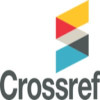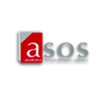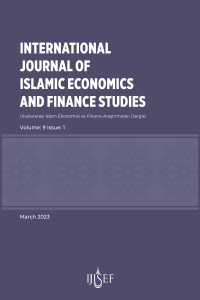Research Article
Aim & Scope
Author Guidelines
Ethical Principles and Publication Policy
Ethical Principles and Publication Policy
•International Journal of Islamic Economics and Finance Studies adopts COPE’s guidelines regarding “allegations of misconduct” in cases of misconduct and violation. Hence, the journal defines in detail the liabilities of the publisher, editors, reviewers, the Scientific Board and authors prior to, during and after the publication process in the Publication Ethics.
•In cases when an article is submitted to various publishers, comparing different versions of a single work submitted to various journals and explanations of authors and enquirers regarding the work in question enables to cooperate and makes an effort in cases of suspected misconduct and violation and to act accordingly together with enquirers/authors and/or their institutions.
•Having regard to the significance of confidentiality in the scientific publication process, the International Journal of Islamic Economics and Finance Studies shares information regarding authors and reviewers only in order to prevent suspected misconduct and to fulfill the obligation to handle such cases.
•Journal editors and theme editors have to make the first inquiries in suspected cases before sharing such information. Thus, sharing information is only at stake when the author does not respond, provides an insufficient explanation or the said allegation of misconduct might affect more than one journal.
•If required, such information is only shared with editors whom are believed to have knowledge of the subject in question, and the shared information is limited with factual content only.
•Editors and theme editors guarantee to protect the confidentiality of communication to the greatest extent possible.
Copyright Regulation and Conflict of Interest Policy
• International Journal of Islamic Economics and Finance Studies considers that possible conflicts of interest among its stakeholders will harm scientific publication ethics. The journal defines its obligations for all its stakeholders in order to detect and prevent conflicts of interest.
• When applying for publication to International Journal of Islamic Economics and Finance Studies, the author declares that he accepts the issues in the Copyright Release Form.
Price Policy
The services provided by IJISEF are free of charge. Author(s) do not need to make any payment for submission, processing and publishing their paper(s) in the IJISEF.
Indexes
Journal Boards
Editor in Chief

Editors

Erhan Akkas is currently an assistant professor at Sakarya University in Turkey. He graduated from Durham University with a Ph.D. in Islamic economics and finance in 2019, after obtaining his master’s in political economy from the University of Sussex. Akkas was a visiting research fellow at Durham University Business School as well as a lecturer at Agri Ibrahim Cecen University in Turkey between 2020 and 2022. An associate professorship was granted to him in February 2023 by the Turkish Interuniversity Board (ÜAK). Akkas has written many academic papers, policy briefs, and edited books. Akkas' most recent research focuses on political economy, Islamic economics, Islamic finance, economic develpment, and GCC countries.

Editorial Board
Banjaran Surya Indrastomo is currently a lecturer at Islamic economics program, Faculty of Economics and Business, University of Indonesia and a member of Board Advisor, Business Risk and Finance Working Group, School of Business and Management, Bandung Institute of Technology in Indonesia. He earned his Ph.D in Islamic economics and finance from Durham University in 2019, after obtaining M.A. in Islamic Finance from Durham University in 2013. Banjaran was an International Fellow at Fondazione per le Scienze Religiose (FSCIRE) in Bologna/Palermo Italy from 2020 to 2021 working on project Teologia, pensiero economico e prassi commerciali: feneratio, ribā e tasso d’interesse fra cristianesimo e islam' (Theology, economic thought and commercial practices: feneratio, ribā and interest rate in Christianity and Islam), co-funded by Banca d’Italia. He has published worked in peer-reviewed Journal, such as Heliyon and Journal of Business Ethics, and has numerous writings both in popular channel and in the form of policy briefs. Beside his academic work, Banjaran is currently involved in shaping Islamic economic and finance industry, acting as Chief Economist of PT. Bank Syariah Indonesia, Tbk, Indonesian largest Islamic/participatory bank and as member of Islamic Economic Board, Indonesian Chamber of Commerce and Industry.

Mervan Selçuk graduated from the Business Department of Istanbul University in 2014. He received his MA and Ph.D. degrees from Islamic Economics and Finance Department at Sakarya University in 2016 and 2021, respectively. His doctoral dissertation is about the feasibility of a monetary union in Islamic countries. He was a visiting researcher at Kuwait University between November 2018 - May 2019. Since 2015, Assoc. Prof. Selçuk has been a research assistant at the Research Centre of Islamic Economics and Finance, Sakarya University. His research areas include Islamic economics, monetary unions, and cryptocurrencies.

He was born on 25 May 1983 in Dimetoka, Greece. In 2006, he graduated from Marmara University Faculty of Theology. He completed his postgraduate education at Marmara University in 2014 and received his doctorate degree in Islamic law. He is currently working as an Associate Professor at Sakarya University Faculty of Theology. His research interests include foundation law and history, classical-modern fiqh thought, late Ottoman legal thought and Islamic economics. Purpose in Waqf: A Research in the Framework of Hanafi Waqf Law, 40 Questions on Waqf, and The Literature of Islamic Law Studies in Turkey (1928-2012), as well as published articles and book translations.

Alija Avdukic is currently a Professor in Islamic Economics and Finance at Al- Maktoum College of Higher Education and is the deputy director of Ph.D. & MSc Islamic Finance programs at Business School of the University of Dundee. Alija holds a Ph.D. in Islamic Economics and Finance (2016) from Durham University; and has MA in Islamic Banking, Finance and Management (2010) from Gloucestershire University. Alija completed his BA (2003) and PGDip (2007) from Al-Azhar University, Cairo, and Damascus University, Damascus.
Alija’s research interest in Islamic economics and its various articulations, Islamic moral and political economy, and Islamic finance and banking. Alija teaches and supervises research on Islamic political and moral economy, Islamic banking, finance, and the political economy of development in the Muslim world. Alija’s recent research includes the construction of Islamic moral economy and Islamic political economy, both of which is considered as an incomplete project since the early 1970s. Secondly, Alija develops the discourse around the ‘social and developmental failure’ of Islamic banking and finance in relation to the expressed ideals of Islamic moral economy by essentializing sharing and collaborative economy nature of Islamic finance. Alija is also involved in empirical research in various aspects and dynamism of Islamic banking and finance.







 Web
Web
İstanbul Medeniyet Üniversitesi
Field Editors (Econometrics)

AĞRI İBRAHİM ÇEÇEN ÜNİVERSİTESİ
Field Editors (Islamic Economics)

Yeditepe Üniversitesi Bilgisayar Mühendisliği Bölümü’nden 2007 yılında mezun oldu. Aynı üniversitede İşletme (MBA) ve Ürdün Bilim ve Teknoloji Üniversitesinde Bilgisayar Bilimleri Yüksek Lisanslarını tamamladı. 2014 yılında Durham Üniversitesi’nde başladığı İslami Finans Doktora programını 2018 yılında tamamlayan Şencal, İslam Ekonomisi ve İslami Finans alanlarında çalışmalarını sürdürmektedir. Araştırmaları ve yayınları İslam Ekonomisinin dar kalıplar içinde yorumlanan bir disiplinden ziyade interdisipliner veya transdisipliner bir yaklaşımla ele alınması ve geliştirilmesi üzerine yoğunlaşmaktadır. Bu bağlamda üniversite, vakıf ve derneklerde alana dair programlar düzenledi ve dersler verdi. Bu alandaki çalışmalarını sunmak için katıldığı uluslararası konferansların yanı sıra uluslararası dergilerde de yayınları bulunmaktadır.

İsa Yılmaz holds a bachelor's degree in Economics and Management from Istanbul Bilgi University and participated in the University of London double degree program, receiving academic guidance from the London School of Economics and Political Science (LSE). He pursued his master's degree in Islamic Finance at the University of Durham (UK) and completed his Ph.D. in Islamic Finance from the same institution. Currently, he serves as an associate professor in the Economics Department at Istanbul Medeniyet University. He has published several academic papers on economic development, financialization and aspects of political economy in Islamic economics. In a broader context, he explores alternative economic and financial systems that strive to envision authentic models with positive developmental and welfare outcomes for emerging economies. To explore these areas, he engages with the literature on the moral economy, political economy, philosophy of economics, and alternative banking and financial models.
Field Editors (Islamic Finance and Banking)

Bolu Abant İzzet Baysal Üniversitesi

Murat Yaş Marmara Üniversitesi İslam Ekonomisi ve Finansı Enstitüsü'nde Dr. Öğretim Üyesi olarak görev yapmaktadır. Ayrıca Japonya'da Sophia Üniversitesi Asya, Afrika ve Ortadoğu Çalışmaları Enstitüsü'nde Ziyaretçi Araştırmacı olarak bulunmuştur. Yüksek Lisans ve Doktora eğitimini Malezya'da INCEIF Üniversitesi'nde İslami Finans alanında tamamlamış ve lisans derecesini Ekonomi alanında Boğaziçi Üniversitesi'nden almıştır. Ayrıca, İngiltere'de Reading Üniversitesi'nde ICMA Centre’da ziyaretçi yüksek lisans öğrencisi olarak bulunmuştur.
Araştırma alanları finansal piyasalar, İslami finans ve Asya çalışmalarıdır.

2011 yılında Ankara Üniversitesi Siyasal Bilgiler Fakültesi İşletme Bölümünden, Yüksek lisansını, 2016 yılında Sakarya Üniversitesi İslam Ekonomisi ve Finansı anabilim dalında “Borsa İstanbul Katılım Endeksinin Piyasa Faiz Oranları ile İlişkisi ve Performansının Analizi” başlıklı teziyle tamamladı. 2020 yılında ise Sakarya Üniversitesi İlahiyat Fakültesinde ikinci lisansını tamamladı. 2021 yılında aynı anabilim dalında “İslami Mikrofinans Programlarının Etkinliği: İksar Karz-ı Hasen Örneği” başlıklı tez çalışmasıyla doktorasını tamamladı. 2014-2021 yılları Sakarya Üniversitesi İslam Ekonomisi ve Finansı Uygulama ve Araştırma Merkezinde araştırma görevlisi olarak çalıştı. Halen Sakarya Üniversitesi Siyasal Bilgiler Fakültesi, İslam iktisadı ve finans bölümünde Doçent olarak görev yapmaktadır.


Doç. Dr. Hakan Aslan, Sakarya Üniversitesi İslam İktisadı ve Finans Bölümü'nde görev yapmaktadır.
Field Editors (Islamic Law)

Batuhan Buğra Akartepe, 2015 yılında Marmara Üniversitesi İlahiyat fakültesinden mezun olmuştur. 5 yıllık lisans eğitimi boyunca İlimler ve Sanatlar Merkezi’nde (İSM) klasik İslami ilimler eğitimini tamamlamıştır. İlahiyat fakültesi sonrasında Anadolu Üniversitesi İktisat Fakültesi’nde ikinci lisans eğitimi almıştır. Yüksek lisans tezini İstanbul Üniversitesi İslam İktisadı ve Finansı bölümünde tamamlamıştır. Halen İstanbul Üniversitesi İslam İktisadı ve Finansı bölümünde doktora çalışmalarına devam etmektedir. 2016 yılından beri İstanbul Üniversitesi Sosyal Bilimler Enstitüsü-İslam İktisadı ve Finansı ABD bünyesinde araştırma görevlisi olarak çalışmaktadır. Çalışma konuları arasında; alacak satımı, kitlesel fonlama işlemleri, girişim sermayesi, İslami hisse senedi endeksleri ve güncel İslam iktisadı meseleleri yer almaktadır.

Siyasal Bilgiler Fakültesi, İslam İktisadı ve Finansı Bölümü
Field Editors (International Economics)

AĞRI İBRAHİM ÇEÇEN ÜNİVERSİTESİ
Field Editors (Finance and Banking)
Türk-Alman Üniversitesi İktisadi ve İdari Bilimler Fakültesi İşletme Bölümünde görev yapmaktadır. Çalışma alanları, kurumsal finans, davranışsal finans ve sermaye piyasalarıdır.

Field Editors (Political Economy)

Yeditepe Üniversitesi Bilgisayar Mühendisliği Bölümü’nden 2007 yılında mezun oldu. Aynı üniversitede İşletme (MBA) ve Ürdün Bilim ve Teknoloji Üniversitesinde Bilgisayar Bilimleri Yüksek Lisanslarını tamamladı. 2014 yılında Durham Üniversitesi’nde başladığı İslami Finans Doktora programını 2018 yılında tamamlayan Şencal, İslam Ekonomisi ve İslami Finans alanlarında çalışmalarını sürdürmektedir. Araştırmaları ve yayınları İslam Ekonomisinin dar kalıplar içinde yorumlanan bir disiplinden ziyade interdisipliner veya transdisipliner bir yaklaşımla ele alınması ve geliştirilmesi üzerine yoğunlaşmaktadır. Bu bağlamda üniversite, vakıf ve derneklerde alana dair programlar düzenledi ve dersler verdi. Bu alandaki çalışmalarını sunmak için katıldığı uluslararası konferansların yanı sıra uluslararası dergilerde de yayınları bulunmaktadır.

İsa Yılmaz holds a bachelor's degree in Economics and Management from Istanbul Bilgi University and participated in the University of London double degree program, receiving academic guidance from the London School of Economics and Political Science (LSE). He pursued his master's degree in Islamic Finance at the University of Durham (UK) and completed his Ph.D. in Islamic Finance from the same institution. Currently, he serves as an associate professor in the Economics Department at Istanbul Medeniyet University. He has published several academic papers on economic development, financialization and aspects of political economy in Islamic economics. In a broader context, he explores alternative economic and financial systems that strive to envision authentic models with positive developmental and welfare outcomes for emerging economies. To explore these areas, he engages with the literature on the moral economy, political economy, philosophy of economics, and alternative banking and financial models.
Field Editors (Economic History)

Layout Editor

Sakarya Üniversitesi İslam Ekonomisi ve Finansı Uygulama ve Araştırma Merkezi
Language Editor



 Web
Web
Sakarya Üniversitesi
Technical Editor

Sakarya Üniversitesi İslam Ekonomisi ve Finansı Uygulama ve Araştırma Merkezi
All articles published on IJISEF are licensed under the Creative Commons Attribution 4.0 International License. This license grants you the right to reproduce, share and disseminate data mining applications, search engines, websites, blogs, and all other platforms, provided that all published articles, data sets, graphics and attachments are cited. Open access is an approach that facilitates interdisciplinary communication and encourages different disciplines to work with each other.





















